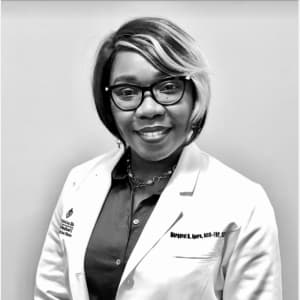COVID-19 Vaccination Hesitancy Among the Nursing Community

A stream of misinformation has accompanied the COVID-19 pandemic. These rumors and outright conspiracy theories have led some to distrust vaccinations. Minority communities have especially felt a sense of hesitancy regarding the COVID-19 vaccine.
Even though they work in the healthcare industry, nurses are not immune to this skepticism.
“Just like everyone else in their communities, nurses are human and can sometimes be subject to the same misinformation as other individuals,” said Dr. Margaret Apara, certified nurse practitioner (NP) and nursing director at Northside Gwinnett Extended Care Center in Atlanta. “COVID-19 has been new for all of us, and we are all still learning.”
This article digs into why some nurses feel distrustful toward the vaccine, along with how they can combat misinformation within their profession.
Vaccine Misinformation on Social Media
“I have witnessed misinformation and plain distrust of the COVID-19 vaccines among nurses,” says Rosa Crumpton, a registered nurse (RN) who works in nursing management. “I have seen this more online in healthcare groups than anywhere else.”
That’s no surprise. Misinformation spreads online — and especially on social media — at a rapid pace. The nature of social media can make it difficult to stop and independently fact-check information, particularly if it plays into a person’s own biases, assumptions, or fears.
Misinformation often spreads on online nurses’ groups, especially on social media sites like Facebook. A Mother Jones investigation found that the Funny Nurses Facebook group has circulated memes comparing vaccination programs in the U.S. to concentration camps.
What Concerns Do Nurses Have About the Vaccine?
Nurses share many of the same concerns as non-healthcare professionals.
“I’ve heard many concerns from numerous people in the community about the unknown impact that the vaccines may have on the DNA marker of an individual that may result in changes to their character, as well as concerns about the vaccine turning into an implanted chip inside the body,” Apara says.
But, as Apara points out, these reservations come from conspiracy theories and have no basis in fact. The mRNA and vector-based vaccines do not change a person’s DNA, despite information shared in Facebook groups and chat rooms — and no microchips are involved, either.
Other nurses might feel more concerned about the timeline.
“Some of the reservations that I’ve seen expressed have been the perceived speed of the vaccine’s development. Many people have said that they feel the vaccine production has been rushed or ‘too quick,'” Crumpton says.
Although vaccines can take years to develop, the urgency of the COVID-19 pandemic led pharmaceutical companies and the government to intentionally speed up the process with $10 billion in federal funds.
How Does Misinformation Affect Healthcare and Patient Care?
Patients trust nurses, who have ranked as the most trusted profession for nearly two decades. Nurses have a responsibility to repay that trust with the best possible information for patients’ health. When nurses feel skeptical about the vaccine, this can harm patients.
“If nurses feel distrustful that the information that they have received is not entirely correct, then they can cause moral distress of their patients who are looking for accurate and unbiased information,” Crumpton warns.
That distrust can “lead to a delay in getting the vaccine,” says Michelle Lew, a family nurse practitioner (FNP) specializing in primary and urgent care in Seattle, Washington. That, in turn, can reduce vaccination rates.
How Nurses Are Dealing With Vaccine Misinformation
Some nurses have taken steps to address misinformation amongst their peers.
As a nursing administrator, Apara has organized town hall education sessions for nurses. These events allow nurses to ask questions about topics like mRNA or vaccine development. Apara also decided to lead by example and get the vaccine early on, which allows her to speak about her experience and symptoms.
“Furthermore, I’ve encouraged others to talk about their symptoms, if they experience any, and provided support to help them work through those side effects,” Apara says.
But nurses don’t necessarily need to work in leadership roles or host town halls to get involved. They can also join groups or chat with their colleagues one on one.
Members of the group Nurses Who Vaccinate sift through online nursing groups, identify misinformation, and participate in outreach to educate nurses who may find these falsehoods compelling. Over 1,000 nurses are now members of the group.
It’s also useful to speak to your peers in the workplace. Remind them that “information found on blogging sites or social media can cherry-pick what type of information they want to write about,” Lew says. She also recommends that nurses consider the source of any online information.
“Just because someone calls themselves a doctor and/or expert, are they an MD/DO vs. naturopath vs. chiropractor vs. having a Ph.D. in communication,” Lew says. “Would you take car advice from your friend’s brother who works at the front desk at a tire place or from a mechanic who has 10+ years?”
Just like nurses’ distrust of the vaccine can affect their patients, their expertise and knowledge of the vaccine can lead to greater vaccination rates and, ultimately, a healthier population.
“Nurses are seen as change agents and have a huge impact on their communities,” Apara says. “People look up to nurses as trusted sources of information, especially when it comes to healthcare.”
COVID-19 Vaccination Resources for Nurses
If you’re interested in educating yourself about the vaccine or passing on information, these resources lay out the facts in an easy-to-digest way. Whenever somebody claims that the vaccine will change someone’s DNA, send them the links below.
- COVID Vaccine Facts for Nurses
- COVID-19 Vaccine FAQs
- Understanding and Explaining mRNA COVID-19 Vaccines
- COVID 19 Vaccination Basics | COVID 19 Vaccines | ANA
Meet Our Contributors

Michelle Lew is a Seattle, Washington-based board-certified FNP specializing in primary care and urgent care. Before becoming an NP, Michelle’s nursing experience covered plastic surgery, general surgery, and orthopedic surgery.
Lew is passionate about nursing and mentors pre-nursing/pre-NP students to give back to her profession in her free time. Michelle is a member of the American College of Nurse Practitioners and the Sigma Theta Tau International Honor Society of Nursing.

Rosa Crumpton (RN, BSN, MBA/HCM) considers herself a Jill of many trades after many roles and specialties in her career. She currently works in nursing management. Rosa helps experienced healthcare professionals reconnect with their purpose without setting unattainable goals, burning out, or feeling demoralized.

Margaret Apara is a certified FNP and currently the nursing director at Northside Gwinnett Extended Care Center in Atlanta. She earned a master of science in nursing – FNP degree from Walden University and a doctor of nursing practice from Chamberlain College, where she graduated with honors.
In addition to the primary care setting, Dr. Apara has worked in medical-surgical, trauma, home care, geriatric care, and nursing home settings. She is an active member of several professional organizations, including the American Association of Nurse Practitioners, American Nurses Association, and Sigma Theta Tau International Honor Society of Nursing.
You might be interested in

COVID-19 Vaccine Obstacles Among Minority Communities
People in racial and ethnic minority groups are disproportionately affected by COVID-19, but many also struggle with vaccine access and readiness. Find out why and how to fix this problem.

How Nurses Can Combat Compassion Fatigue
Compassion fatigue can affect all nurses. Learn how to combat compassion fatigue, how to nurture and support yourself, and continue providing quality patient care.